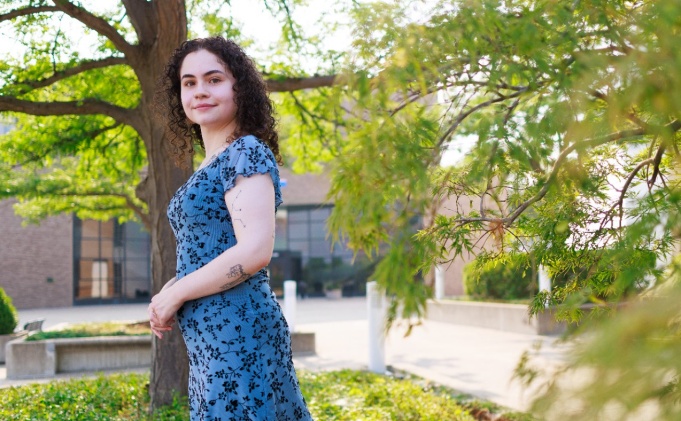Endometriosis: The forgotten reproductive justice issue
Ava Lockwood, MSW ’25. Photo: Stephen Gabris.
By Ava Lockwood, MSW ’25
In November 2023, just three months into my MSW program, I sat in front of my computer engaging in dialogue on systems theory when my career trajectory changed.
At the time, I was only 21 years old and recovering from a total hysterectomy due to endometriosis, a debilitating disease that occurs when tissue similar to the lining of the uterus grows outside the uterus. By that point, I had experienced symptoms for 11 years before diagnosis, undergone four surgeries over a two-year span and was struggling to function in graduate school due to the severity of my pain.
Despite enduring multiple surgeries, being pumped full of menopause-inducing medications and spending many days bedridden because of my disease, I still found myself facing significant dismissal from medical professionals. I was told my pain was “purely psychological” and I was “too young to be sick.”
As I sat in the lecture, listening to my professor discuss the significance of systems theory, I realized my experience with endometriosis was not anomalous, but, rather, indicative of a larger social justice issue. From that point forward, I vowed to dedicate my career to creating a more equitable health care landscape for those living with endometriosis.
About endometriosis
According to the Center for Endometriosis Care, endometriosis affects at least 1 in 10 individuals assigned female at birth, with some estimates as high as 1 in 7. Additionally, the disease is considered one of the 20 most painful conditions a human being can endure, causing such symptoms as chronic pelvic and lower back pain, severe menstrual cramping, nausea, infertility, painful intercourse and even lung collapse in some cases.
It takes an average of seven to 12 years to be diagnosed with endometriosis, because the disease can only be confirmed via surgery — and often repeated surgeries, as in my case. To compound these challenges, while excision — or surgical removal of endometriosis at the root — is considered the gold standard treatment for the disease, few surgeons receive this training, creating widespread inaccessibility of treatment.
Despite the disease’s high prevalence and devastating symptoms, there is no cure, and it remains under-researched and underfunded compared to other diseases of similar prevalence. In 2022, endometriosis research made up 0.04% of the National Institutes of Health budget, allocating just $2 for every person with the disease.
In recognizing the significance of health disparities impacting those with endometriosis, it is critical to understand that endometriosis is not simply a disease; it is a social and reproductive justice issue, leaving many of those living with it traumatized at the hands of the medical system.
A call to action
As social workers, we are called to advocate for social and reproductive justice regardless of which practice levels we work within. When it comes to advocating for clients living with endometriosis, these are some key actions and resources to be aware of as you engage in this work:
At the macro level, support and advocate for initiatives and legislation that call for increased funding for and proper allocation of endometriosis research. For example, in 2021, the Endometriosis Foundation of America (EndoFound) created the UpEndo Coalition to raise awareness for the disease, and Rep. Nikema Williams introduced the bipartisan Endometriosis CARE Act last year to increase research and treatment access.
At the mezzo level, volunteer and collaborate with programs that reach out to and educate children and young adults about endometriosis. During my time as an MSW student, I served as a college ambassador for the ENPOWR Project, the EndoFound’s youth-centered education initiative, and was able to educate over 500 UB students on endometriosis.
At the micro level, understanding that endometriosis can generate immense trauma and loss for those living with it is critical in how you apply interventions. While people with endometriosis are not a monolith, learning trauma-specific and somatic interventions can be helpful in assisting those living with the disease.
During my advanced year, I attended the Endometriosis Summit in Orlando, where I learned specific interventions for working with individuals living with medical trauma due to endometriosis. One of these interventions is the body map, a form of storytelling that depicts lived experiences of adversity, trauma or chronic disease through hand-drawn body outlines. In my therapy practice, this intervention has helped clients feel empowered in conveying their experiences with endometriosis through art.
As I prepare for my fifth endometriosis surgery, I hope you will join me in this pursuit of reproductive justice as I transform my pain into power. By centering the lived experiences of those with endometriosis in the fight for reproductive justice, social workers can advocate for a more holistic health care landscape for all.
Ava Lockwood, MSW ’25, is a therapist in a community mental health clinic. Ava is passionate about integrating EMDR, somatic interventions and parts work with clients who have experienced complex trauma and chronic pain.
